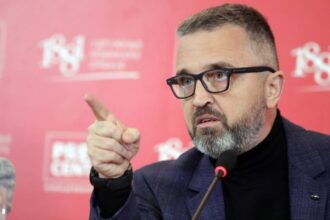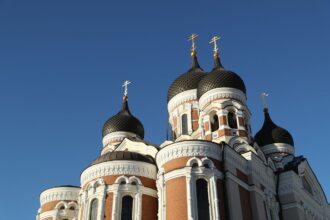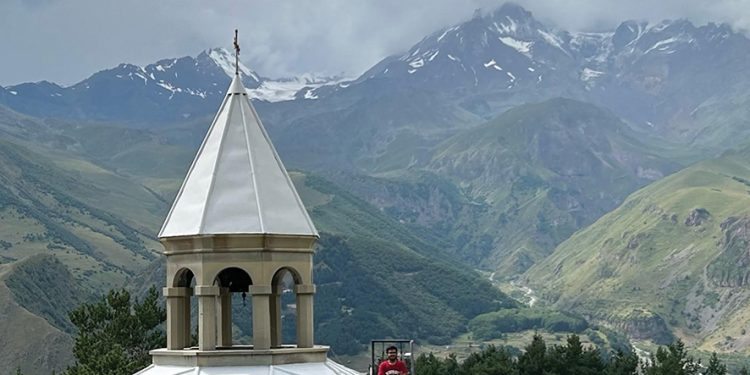When I was in Georgia I visited the tomb King Erekle II of Kartli & Kakheti, King of Eastern Georgia, located in the Svetitskhoveli cathedral in Mtskheta. This king was sent to India as a prince by Nadir Shah, Emperor of Iran who was at that time invading India. Rafail Danielbegashvili, a Georgian statesman, wrote a travelogue entitled “The Travels of Rafail Dannibegashvili In India, Burma, and Other Asian Countries, 1795-1827″ that tells us more about the Indian connections. Who was this traveler and what did he experience in India, which is known for its diversity,? In this article, I will attempt to answer these questions.
India is a state with a great deal of diversity. For centuries, travelers have come from all over the world to explore the diverse landscapes and learn about Indic religions. Georgia’s ties with India date back to ancient times. Trade between them flourished long before the modern era. The Transcaucasus was the route of the great trade route connecting India with the Mediterranean countries. This included Mtskheta (now Poti), Fazis and other towns. In Varanasi in India, there is an inscription on a gravestone that says, in Georgian: “Here lies the Georgian Merchant Tamaz Khuduashvili from the village of Kojori near Tbilisi who died in 1782.”
Al-Masudi was one of the travelers in the past who visited India. Others were Fa-Hien and Hiuen Tsang. Abdul Razak, Marco Polo and the Georgian nobleman Rafail Danigashvili. In his travelogue, it is stated that a wealthy Armenian named Shakhamiryan lived in Madras, now known as Chennai, who sent King Erekle 2 gifts every year to help him establish an independent Georgian Armenian kingdom. The king gave him the large village of Loris as a reward and instructed Danibegashvili that he should give the title-deed over to him. In order to obey the king’s order, the nobleman went to India on 15th March 1795. The Armenian he had been expecting to meet died a year prior to his arrival. He therefore gave the title deed to the Armenian’s son.
What was Danibegashvili’s background? He was a wealthy merchant from Tbilisi, who sailed from Muscat, Oman, and disembarked 22 days later in Bombay (now known as Mumbai), the financial capital of Maharashtra State in India. What did he see when he arrived in Bombay, India? In his travelogue, he wrote that “…because it is located in the center of India, it can be called the main English port. From here, ships sail on to China, Persia, and India. Bombai’s (Mumbai’s) fame is also due to the fact that the finest English ships are made there.
Mumbai was under the English East India Company at the time, and a conglomerate in India, Wadia Group, which still exists today, built the first ships outside England for the British Navy in Mumbai, where Rafail Danibegashvili had visited. The Wadias were Zoroastrians, or Parsis. Georgian readers may know that a non-functional Zoroastrian Fire Temple still exists in Tbilisi. Danibegashvili’s travelogue mentions the Zoroastrians in Mumbai and writes that “This town is especially famous for its merchants who are extraordinarily wealthy.” All the locals are fire worshippers, and they call themselves Kabers or Farses.
While Mumbai on the west coast of India was colonized, another settlement, Pondicherry (now known as Puducherry), on the east coast of India was colonized. Danibegashvili wrote “…I arrived in the town of Bondochery, or Kost Malvar (Puducherry). The English now own this town, which was once ruled by France. It is built on the model of European cities. The majority of the residents are French and can be described as old-timers. “The native inhabitants are black-skinned and fire-worshippers, just like the towns around them.”
Chennai is another big city in India. It was the former capital of British India. Danibegishvili, who visited Chennai when it was known as Madras and wrote that “…In the town, there are many and rare fruits, including the pineapple. The soil is fertile and the water is good. Three versts away from this town lies the grave of Saint Thomas. Six versts away is the desert, where the apostle once lived and where a monastery and a splendid church now stand.
The Malabar, Coromandel, and Persian Churches have held that Thomas, the Apostle, died near the ancient Indian town of Mylapore. St. Thomas was martyred in A.D.72, and buried in Mylapore. This is the same place where the Georgian traveler Danibegashvili visited.
Kolkata, formerly known as Calcutta and also a former presidency town in India, is another town that Danibegishvili has written “…Kalcada. It is a beautiful town. Many rich people live there. It is located on the Ganges River’s bay. There are many Armenians who live there. They lead a rich, opulent life and are involved in a flourishing trade with foreigners. There are also Englishmen, French, and most importantly, Portuguese. In addition to Indians – who are all generally idolaters – and Mohammedans – the natives themselves – there are also Indians.
Danibegishvili traveled to Benaras, an ancient India city that is a center of Shiva worship for Hinduism and Buddhism. Danibegishvili wrote in his travelogue about it that “…This city is revered by Indians as a Holy City. For this reason, rich Indians who reach old age leave all of their wealth and their families, except for the money needed to maintain them, and go to the town with the intention to die there. This tradition is so ingrained that it is said that anyone who dies in the town will be freed from suffering in their future lives, even if they deserve such suffering. Locals are idolaters in general. They hold the cow in high esteem. Even its urine is used as a smear to cleanse defiled vessels and smear the face.
Danibegishvili visited Delhi, the capital of India and the mountainous region known as Kashmir. I visited the Gergeti Trinity Church, the Icon of Elias (Saint George) of Stepantsminda and the Gergeti Trinity Church during my visit to Georgia. Stepantsminda reminded me of the Kashmir region in India, especially when it came to the natural beauty. While Stepantsminda is situated in the Caucasus mountains, Kashmir is in the Himalayas. Both have stunning natural beauty. Danibegishvili said in his travelogue about Kashmir that “…The surroundings of Kashmir are pleasing to look at. In summer, the mountains surrounding the town are covered in bright greenery. There are many canals in the town, and a 19-metre-circumference lake in the middle. A stone fort was built on a mountain near the lake. The water is crystal clear and the lake is quite deep. On Fridays, people row their boats on the lake. Even today, Georgians can see Kashmiris rowing in the Dal Lake.
According to Levan Iosifovich Marutashvili, “Danibegashvili unambiguously sided with India.” His sympathies were with the brave struggle of the Indians against invaders. On two occasions, he noted that the English had not captured a town.
The relationship between India and Georgia is indeed very old. In 2018, the Prime Minister of India Narendra modi was gifted a wall-painting titled “Travels Of Rafail Daniibegashvili”.
I hope that the people of India, and Georgia will travel more to the other country and learn more about the culture. This way, the diplomatic relations between the two countries will be even stronger. God bless India-Georgia’s friendship.
Blog by Arunansh Goswami, Historian & Advocate in Supreme Court of India
Read More @ georgiatoday.ge












